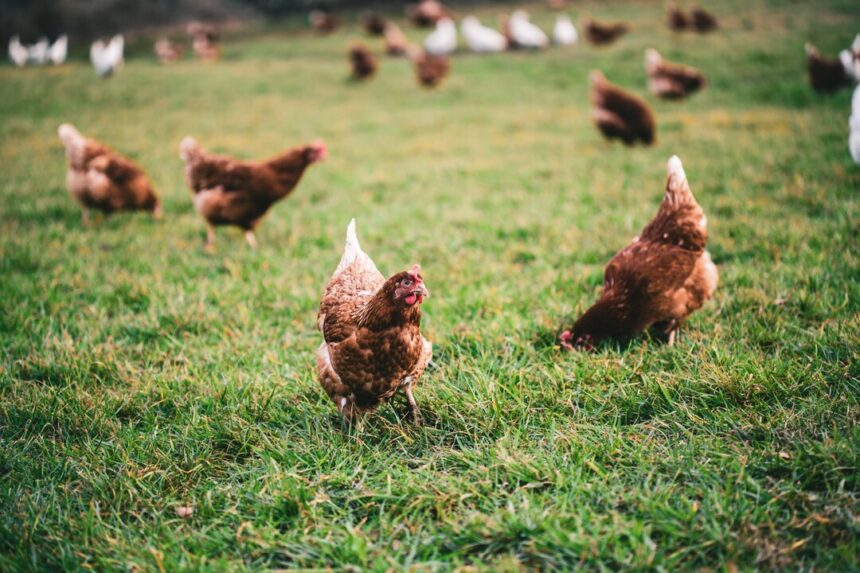Raising free-range poultry can be a rewarding endeavor, allowing birds to roam and forage in a natural environment while producing high-quality eggs and meat. However, managing free-range poultry comes with its own set of challenges, from predator protection to flock health. Here are some essential tips for successfully managing free-range poultry:
1. Secure Fencing: Ensure that your free-range area is securely fenced to prevent predators such as foxes, dogs, and birds of prey from accessing the flock. Use sturdy fencing materials and bury wire mesh underground to deter burrowing predators.
2. Shelter: Provide adequate shelter for your poultry to seek refuge from inclement weather, extreme temperatures, and predators. Coops or shelters should be well-ventilated, predator-proof, and spacious enough to accommodate the flock comfortably.
3. Supervised Free-Ranging: While free-ranging allows poultry to roam and forage freely, it’s essential to supervise their outdoor activities to ensure their safety and well-being. Regularly check on the flock and monitor for signs of distress, illness, or predation.
4. Rotate Grazing Areas: Rotate the grazing areas for your free-range poultry regularly to prevent overgrazing, maintain pasture health, and minimize parasite buildup. This rotational grazing strategy also allows vegetation to recover and provides fresh forage for the flock.
5. Provide Clean Water: Ensure access to clean, fresh water at all times to keep your poultry hydrated and healthy. Regularly clean and refill water containers to prevent contamination and algae growth.
6. Balanced Diet: Supplement the natural forage available to free-range poultry with a balanced diet that meets their nutritional needs. Provide access to quality poultry feed, grit, and calcium supplements to support egg production and overall health.
7. Monitor Health: Keep a close eye on the health of your free-range poultry and promptly address any signs of illness or injury. Conduct regular health checks, including examining feathers, eyes, feet, and droppings, and consult with a veterinarian if necessary.
8. Pest Control: Implement pest control measures to minimize the risk of parasites and disease transmission among your free-range flock. Practice good sanitation, use natural predators such as beneficial insects, and consider herbal remedies or diatomaceous earth for pest management.
9. Egg Collection: Collect eggs from nesting areas frequently to prevent them from being damaged or eaten by predators. Provide clean nesting boxes with suitable bedding materials to encourage hens to lay eggs in designated areas.
10. Predation Deterrents: Implement predator deterrents such as motion-activated lights, sound devices, or guardian animals (e.g., dogs or llamas) to deter predators and protect your free-range poultry flock.
11. Record Keeping: Maintain detailed records of your free-range poultry operation, including flock size, health status, egg production, feed consumption, and expenses. This information can help you track performance, identify trends, and make informed management decisions.
12. Biosecurity Measures: Implement biosecurity measures to prevent the introduction and spread of diseases among your free-range poultry flock. Practice strict hygiene, limit visitors to the flock area, and quarantine new birds before introducing them to the existing flock.
13. Weather Protection: Provide additional protection for your free-range poultry during extreme weather conditions, such as heatwaves, cold snaps, or storms. Offer shade, shelter, and supplemental heat or cooling as needed to keep the flock comfortable and healthy.
14. Minimize Stress: Minimize stressors for your free-range poultry flock, such as overcrowding, excessive handling, or sudden changes in routine. Create a calm and predictable environment to promote flock welfare and productivity.
15. Continuous Learning: Stay informed about best practices and advancements in free-range poultry management through books, online resources, workshops, and networking with other poultry enthusiasts. Continuously seek opportunities to improve your knowledge and skills as a poultry keeper.
By implementing these tips for managing free-range poultry, you can create a safe, healthy, and sustainable environment for your flock to thrive and produce high-quality eggs and meat. With proper care, attention to detail, and a commitment to best practices, raising free-range poultry can be a fulfilling and rewarding experience for poultry keepers of all levels.
Join 'Farmers Mag' WhatsApp Channel
Get the latest Farming news and tips delivered straight to your WhatsApp
CLICK HERE TO JOIN






